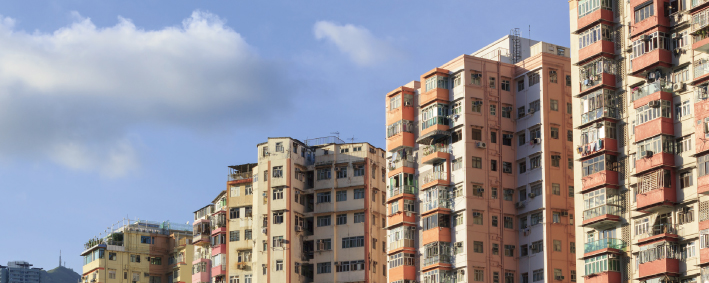 |
CCCH9033 China: Culture, State and Society
|
Course Description
The Sustainable Development Goals (SDGs) were set up by the United Nations in 2015 to “achieve a better and more sustainable future for all.” In response to the SDGs, this course explores how Hong Kong responds and reacts to various issues related to sustainable urban living. As a global city with unique cultural, historical, economic and political setups, sustainability is a pressing concern and holds the key to the long-term urban development of Hong Kong. The emphasis of the course is on understanding sustainable urban development in the context of a high-density, market-oriented Asian world city.
Urban sustainability is more than an environmental concept: It also includes the ethical utilization of resources, geographical equity, both inter- and intra-generational equity; as well as touching upon such social, economic and political issues, accommodating multi-cultural and diversified aspirations, ensuring public engagement and nurturing public participation and partnership in the development process. The course offers a regional and comparative perspective to the understanding of the challenges that Hong Kong faces in maintaining her competitive role in the Greater Bay Area and the world.
[There will be a compulsory field trip in the semester.]

Course Learning Outcomes
On completing the course, students will be able to:
- Explain urban sustainability challenges at the global level and examine responses in Hong Kong.
- Use various sources of information to assess Hong Kong’s performance in terms of tackling various global issues.
- Apply knowledge generated in the cases of Hong Kong to understand and examine sustainable urban development issues in Chinese cities.
- Demonstrate a reflective response to global sustainability challenges in the context of Hong Kong and an awareness of the implications of such responses on the challenges China is facing in post-Covid-19 era.
Offer Semester and Day of Teaching
First semester (Wed)
Study Load
| Activities | Number of hours |
| Lectures | 20 |
| Tutorials | 10 |
| Fieldwork / Visits | 15 |
| Reading / Self-study | 45 |
| Video | 5 |
| Assessment: In-class assessments | 15 |
| Assessment: Presentation (incl preparation) | 40 |
| Total: | 150 |
Assessment: 100% coursework
| Assessment Tasks | Weighting |
| Class participation | 10 |
| Individual oral presentation on selected reading | 10 |
| Reflection writing | 30 |
| In-class quizzes | 10 |
| Group report | 40 |
Required Reading
Required reading for tutorial sessions:
- Cheung, T. T. T, & Fuller, S. (2022). Rethinking the potential of collaboration for urban climate governance: The case of Hong Kong. Area, 54(3), 408–417. From https://doi.org/10.1111/area.12781
- Chu, C. (2007). Heritage of disappearance? Shekkipmei and collective memory(s) in post-handover Hong Kong. Traditional Dwellings and Settlements Review, 18(2), 43-55.
- Guilloux, A. (2018). Cross-Boundary Disaster Risk Governance: Lessons from the Pearl River Delta. In M. Miller, M. Douglass, & M. Garschagen (Eds.), Crossing Borders. Springer, Singapore. From https://doi.org/10.1007/978-981-10-6126-4_8
- Li, L. – H., Wong, S. K. K., & Cheung, K. S. (2016). Land supply and housing prices in Hong Kong: The political economy of urban land policy. Environment and Planning C: Government and Policy, 34(5), 981–998.
- McFarlane, C. (2021). Repopulating density: COVID-19 and the politics of urban value. Urban Studies, 0(0). From https://doi.org/10.1177/00420980211014810
- Soyinka, O., & Siu, K. W. M. (2018). Urban informality, housing insecurity, and social exclusion; concept and case study assessment for sustainable urban development. City, Culture and Society, 15, 23–36. From https://doi.org/10.1016/j.ccs.2018.03.005
- Tracey, A., Trumbull, K., & Loh, C. (2007). The Impact of Climate Change in Hong Kong and the Pearl River Delta. China perspectives, 2007(69), 18-29.
- UN.ESCAP. (2020). The future of Asian & Pacific cities: transformative pathways towards sustainable urban development in the post COVID-19 era. From: https://hdl.handle.net/20.500.12870/3541 [pp. 8-50]
- UNESCO & World Bank. (2021). Cities, Culture, Creativity: Leveraging Culture and Creativity for Sustainable Urban Development and Inclusive Growth. UNESCO: Paris and World Bank: Washington, DC. [pp. 12-21, 88-96]
- Xia, C., Yeh, A. G. -O., & Zhang, A. Q. (2020). Analyzing spatial relationships between urban land use intensity and urban vitality at street block level: A case study of five Chinese megacities. Landscape and Urban Planning, 193, 103669.
Course Co-ordinator and Teacher(s)
| Course Co-ordinator | Contact |
| Professor C.P. Connolly Department of Urban Planning and Design, Faculty of Architecture |
Tel: 3917 4895 Email: connolly@hku.hk |
| Teacher(s) | Contact |
| Professor C.P. Connolly Department of Urban Planning and Design, Faculty of Architecture |
Tel: 3917 4895 Email: connolly@hku.hk |

